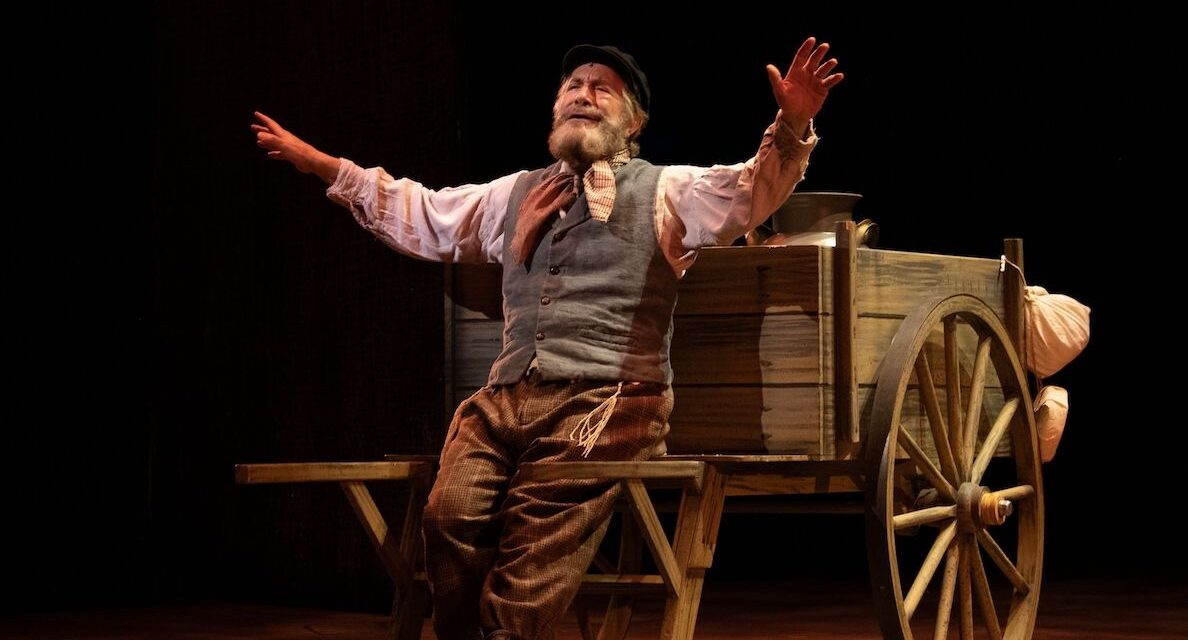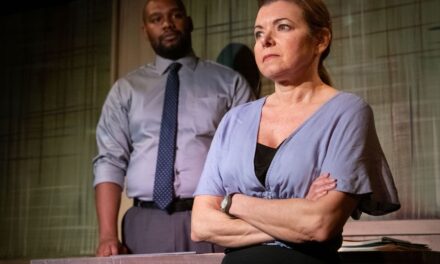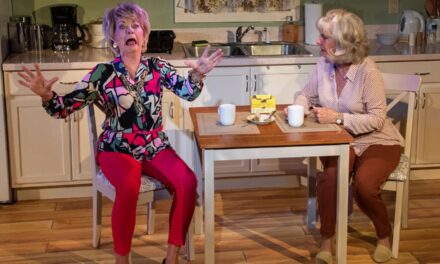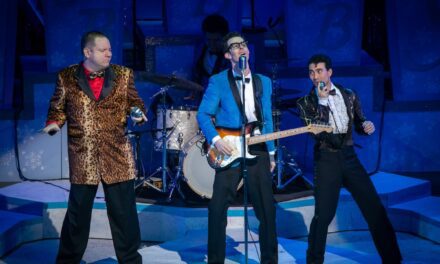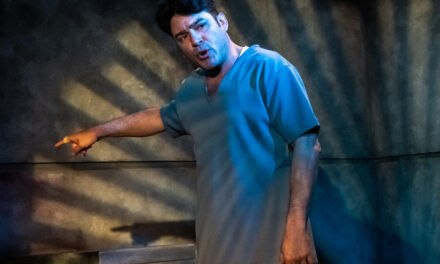Theater Review by Myra Chanin . . . .
I really wanted to write a special review about The Wick Theater’s production of Fiddler on the Roof, because I found the performance so compelling. It made me feel I had traveled backward through time to Anatevke in 1906, which I might add was not a great year for Russian Jews. A hundred of them were murdered during a government-initiated pogrom in Bialystok, a city which the Empress Catherine the Great in 1791 had legally authorized as a site that would welcome colonization by Jews in the hope of increasing its population and cultivating its economy.
Tevye was created by Sholem Aleichem, the son of a rich Jewish merchant whose ill-advised investments impoverished the family. Sholem’s mother died of cholera when Sholem was thirteen and, in another ill-advised choice, his father wed a shrew who inspired her stepson to publish a glossary of the insults and curses she heaped on him—which were hilarious . . . if they weren’t directed at you. Eventually, he became a teacher, then a tutor to a wealthy landowner’s daughter, who married him against her father’s wishes. Her father and her husband obviously reconciled, because when her father died three years later he left his substantial estate to Sholem, who moved his family to Kyiv before he blew it all by buying the wrong stocks. He became a writer/journalist and a popular lecturer and eventually moved to New York. My parents owned a 25-volume set of Sholem Aleichem’s complete works in Yiddish. When he died in New York in 1916 at age 57 from diabetes and tuberculosis, his funeral attracted 100,000 mourners, the most ever seen at a funeral in New York.

Sholem met the prototype for Tevye, his most beloved creation, on a train trip through Russia. Tevye was a struggling entrepreneur who peddled dairy products, produced from his cows’ milk, to neighboring villages to support his wife and their five marriageable daughters who lacked dowries, which might have attracted the rabbinical scholars Tevye would have welcomed as sons-in-law. Tevye, the project, also attracted several Tony-winning creatives: composer Jerry Bock, lyricist Sheldon Harnick, choreographer/director Jerome Robbins (the only genius Steven Sondheim said he’d ever met), and actor/comedian Zero Mostel. Robbins and Mostel had been questioned by the House Un-American Activities Committee (HUAC) about their communist activities. Robbins, a closeted homosexual, fearful of the FBI who’d threatened to out him and end his career if he didn’t name names—so he eventually did. Zero refused to cooperate and was blacklisted from film and TV but started a career as a painter, proving that you can’t keep great talent down.


Finding investors wasn’t easy. Would it be too Jewish for mainstream audiences or too culturally sanitized, middlebrow, and superficial? Philip Roth, whose road to fame and fortune included hooking up with a slice of calf’s liver, had the chutzpah to call Fiddler “shtetl kitsch” in The New Yorker. Azoi!
Variety’s opening night review for the Detroit tryout was not inspiring, but Jerry Robbins stuck to his plan of correcting ten details a day. Robbins’ biggest concern was not receiving an answer to a question he constantly asked everyone, “What’s this show about?” Finally, someone suggested the show was about how traditions sustain communities. Robbins immediately told the composer, lyricist, and librettist (Jerry Bock, Sheldon Harnick, and Joe Stein) to create a powerful new opening based on that idea. “Tradition,” a forceful anthem, became the universal emotional tapestry behind the play and the players, being attacked by change in the world around them. These feelings are universal, which is why Asians, Africans, Europeans, Americans, and everybody else relate to Tevye and the citizens of Anatevka like members of their community.


Now on to Delray Beach and the glorious new Wick Theater production of Fiddler on the Roof. It was as haimish, decent, modest, and unpretentiously honest and powerful as Tevye’s existence. I wrapped myself in the shawl of every syllable uttered and every note sung and took them home with me. The casting was marvelous but uncredited, so I presume everyone who needed a say had one. I cannot praise Bruce Sabath’s Tevye enough. It was different. He dug into himself to find the Tevye within his own soul. I can’t wait to buy a Sabbath wig like Patti Gardner’s. It may even bring me back to the fold.
Spontaneous applause frequently followed beautifully presented songs. Audience members nodded approval as Tore D’Allesandro, Mallory Newbrough and Caila Katz, Tevye’s daughters, realized their grooms might be as old as Tevye instead of one of the tall handsome guys, Michael Scott Ross, Alex Martinez, Cameron Edris, who could really sing and dance. I was also impressed by Rachel Matz Hunter’s Yenta, who presented the matchmaker not as a stand-up comic, but as the poor widow trying to find acceptable mates that would not enrage future brides and grooms.
I commend the boldness and daring of Director Norb Joerder and Choreographer Robert Abdoo, who tweaked Jerome Robbins’ masterful bottle dance and curiously extended the tension of it by starting with only two dancers and giving me a panic attack while I anxiously waited for (and if) the two to become four.


The sets and the projections were subtle and warm, bathed with the colors of spring. Even the way that Fruma Sarah (Melissa Goldberg) returned from the grave, tinged by Clifford Spulock’s green lighting, was quietly hysterical. And, as always, kudos to Musical Director Bobby Peaco—it’s always a pleasure to think of his finger waving a baton.
The Wicks have done it again. Long may their wick continue to illuminate the arts and ably demonstrate why such a Jewish story has been presented on at least one stage somewhere on this planet for every day of the last 60 years.
Fiddler on the Roof. Through February 11 at the Wick Theater (7901 North Federal Highway, Boca Raton, FLORIDA) www.thewick.org/fiddler-on-the-roof or call 561-995-2333 for tickets
Photos: Amy Pasquantonio


